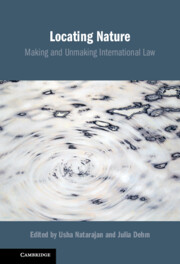Book contents
- Locating Nature
- Locating Nature
- Copyright page
- Contents
- Contributors
- Foreword
- Acknowledgements
- Introduction: Where Is the Environment?
- Part I Locating Nature in International Law
- Part II Unmaking International Law
- Part III Alternatives and Remakings
- 10 Three Enclosures of International Law
- 11 The Mythic Environment
- 12 Law and Politics of the Human/Nature
- 13 Narrating Nature
- 14 Inter-Nation Relationships and the Natural World as Relation
- Conclusion
- Index
13 - Narrating Nature
Climate Imaginaries in International Law
from Part III - Alternatives and Remakings
Published online by Cambridge University Press: 22 September 2022
- Locating Nature
- Locating Nature
- Copyright page
- Contents
- Contributors
- Foreword
- Acknowledgements
- Introduction: Where Is the Environment?
- Part I Locating Nature in International Law
- Part II Unmaking International Law
- Part III Alternatives and Remakings
- 10 Three Enclosures of International Law
- 11 The Mythic Environment
- 12 Law and Politics of the Human/Nature
- 13 Narrating Nature
- 14 Inter-Nation Relationships and the Natural World as Relation
- Conclusion
- Index
Summary
This chapter explores narratives of ‘nature’ in the context of climate change and the attendant creation of global and local subjectivities, both resilient and resistant. It first examines dominant renderings of nature and the biopolitics of climate governance before turning to consider counter-narratives of rights, the recuperation of ‘vernacular landscapes’ and their affective maps, and literary interventions into global climate imaginaries. This analysis reveals apparently competing, yet ultimately mutually constitutive, narratives: the increasingly prevalent discourses of resilience and adaptation in global climate change governance, and modes of resistance and reimagination. Given contemporary critiques of the neoliberal and neocolonial biases of international rights regimes, this chapter considers the capacity for local communities to articulate resistance to global climate governance within the language of rights and within the literary imagination. Such resistances reveal a constitutive relation between the global and the local, and the human and the nonhuman, providing a methodology for reimagining nature in international law.
- Type
- Chapter
- Information
- Locating NatureMaking and Unmaking International Law, pp. 332 - 353Publisher: Cambridge University PressPrint publication year: 2022



